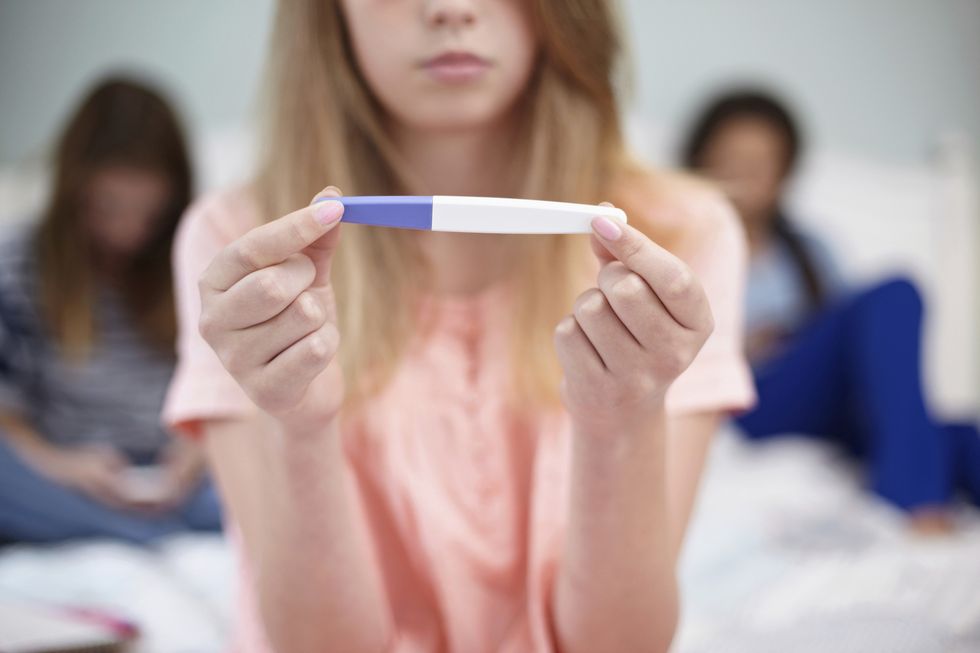- A study was published in multiple mainstream newspapers, including The Times and the Mail Online, claiming that sex education in schools directly correlates with a rise in teenage pregnancies.
- It contradicted the findings of countless other studies that have been published over the past decade, yet many outlets still backed it.
- ELLEUK.COM dug further into the matter to find that, not only were the study's findings spurious, but that it was commissioned by someone with a Pro-Life (anti-abortion) background.
- The same person also belonged to the Society for the Protection of Unborn Children group (SPUC).
- A lesson in doing due diligence as journalists.
At the start of the month, various headlines cropped up about a new study which suggested that a lack of sex education has actually contributed to fewer teenagers falling pregnant.
It was surprising news to anyone pushing for women to be educated about and, ultimately, to feel like they have full dominion over their own bodies.
Especially, as it was only announced in March that sex education is to be compulsory in English schools after years of campaigning for it to become so.
Following the surfacing of this new, widely touted study, many of us were left saying, 'But, how on Earth could more information about contraception, relationships and sexual health be a bad thing?'
The headlines came about after some newspapers, including The Times and Mail Online, jumped on the findings of this study, which was published in the Journal of Health Economic, and carried out by Professor David Paton of Nottingham University Business School and Liam Wright from the University of Sheffield.
The Mail on Sunday columnist Peter Hitchens – who in 2011 got booed on BBC's Question Time for suggesting sex education encouraged teen pregnancies and STIs – was jubilant in his reporting, calling for the scrapping of "so-called sex education and all the rest of the condom-waving and pill-pushing designed to appease and spread the permissive society". Ok, then.
The study in question claimed that, after analysing the impact of local authority cuts to sex education, "in contrast to predictions by politicians and organisations working in the field, local areas which imposed bigger cuts to projects aimed at reducing teenage pregnancy have, on average, experienced faster decreases in teenage pregnancy rates".
What we know for certain, is that teenage pregnancy rates have fallen. In fact, they have halved since 1998. In 1999, the Labour government launched a 10-year strategy to tackle the high rates of teenage pregnancy which existed across the UK (4.6 per 1,000 according to the Family Planning Association). Included in the strategy, was a greater push for sex education, more access to contraception for young people and the government ring-fenced money especially for the strategy.
But Professor Paton has claimed that teen pregnancy has continued to decrease while apparent funding dried up, saying that those hit particularly hardest by the lack of funding actually had the biggest decline in teen pregnancy rates.
Correlations Don't Necessarily Merit Conclusions
This is completely at odds with what Kaye Wellings, Professor of Sexual and Reproductive Health Research, at the London School of Hygiene and Tropical Medicine found in a study she published last year. In a study published in The Lancet, she found "higher levels of Local Implementation Grant funding were associated with faster rates of decline in more deprived English areas".
Wellings told ELLE UK she thought Professor Paton's findings were "flawed" proposing that there would be many more alternate reasons why teenage pregnancy rates might fall, instead of less sex education.
"If you put two sets of figures together and draw conclusions, you need to think about a lot of alternate reasons for the two things coming together," she says.
She firstly stresses that funding was not cut, in the majority of cases, but the money was no longer government-protected and some of it was mainstreamed into local authorities. Just because some of the funding may have decreased, it does not mean sex education stopped as the whole point of the ten-year strategy was to train, develop and nurture the way sex education is taught in schools over time.
"You don't train [teachers] in 2000 and get sex education to improve by 2001. You train over a period of five to 10 years and gradually the teachers going into the schools are better equipped to teach sex education. It is absolutely bonkers to say funding stopped and therefore sex education stopped – schools would laugh at that," she says.
Other factors include the fact that under the strategy was a campaign to change the social norms around teen pregnancy. Wellings says attitudes towards teen pregnancy started shifting after the early 2000s with it becoming more "unfashionable" to be pregnant at a younger age.
Thirdly, there was a push for long-acting, reversible methods of contraception (or LARCs as they are known in the industry) by the National Institute for Health and Care Excellence (NICE) in 2004. Some LARCs you'll have heard of include the Mirena coil and the implant, and teachers, teen pregnancy coordinators and doctors were all encouraged to suggest these methods to teenagers other than just the pill or condoms.
Family planning clinics and teen pregnancy coordinators were also told to improve the "youth-friendliness" of their services so that teens needing contraception or sexual health advice would feel more comfortable coming in for advice.
"If you think of all these things, none of them are going to stop in 2010," Welling says. "Firstly, it is a myth the funding stopped… but also all these things that were happening in the 2000s didn't kick in straight away, they gradually took effect.
"The figures started to drop very precipitously in 2006 to 2007 and 10 years after the strategy they started to drop even more precipitously but that, to me, is what you would expect from a 10-year strategy."
Interpret Cautiously
This was supported by the FPA sexual health charity who stressed that the findings of the controversial study needed to be interpreted cautiously.
"The idea that increased access to contraception and good quality relationships and sex education leads to a rise in unwanted pregnancies is a persistent – but inaccurate – myth," they said in a statement.
Professor Paton told ELLE UK that he agreedthere was a need to be "cautious" about his results but said "all the evidence seems to be that there is a statistically significant – yet small – effect" of cuts to spending on teenage pregnancy.
Wellings questioned Paton's "agenda" for concluding something that seems "completely contrary to your intuitive logic".
Hidden Agenda?
Professor Paton denied he had an agenda, but he did admit to us that he was invested in the subject matter. His history, by his own admission, includes a "background in the Pro-Life [anti-abortion] movement".
Professor Paton has spoken at several events for the Society for the Protection of Unborn Children group (SPUC) – a prominent anti-abortion group.
However, he said "it is important to separate what you think should be happening for moral reasons and what the evidence says". He also maintains that he is not against sex education in schools, yet has previously spoken about what he believes to be the ineffectiveness of sex and relationship education (SRE) on several occasions.
Backtracking
He has previously suggested that falling teenage pregnancy rates could come down to this generation supposedly taking less risks than those before them as well as their increased use of social media. He also played down suggestions that LARCs are "the driver" of less pregnancies.
Dr Claudine Provencher, a social psychologist from LSE attributes much of the hype of an apparent link between SRE cuts and low teen pregnancy rates to being distorted by the media.
"This is yet another example of the problematic way newspapers tend to report scientific studies, especially in the area of health," she told ELLE UK, referring to The Times' conclusion that 'Teenage pregnancy rates have been reduced because of government cuts to spending on sex education and birth control for young women" and the Mail building on these findings.
So, all in all, no, a lack of funding for sex and relationships education is not likely to directly contribute to lower rates of teen pregnancy.
Unquestionably, rates have fallen and this is more than likely due to a number of contributing factors including the government's teen pregnancy strategy, increased sex education, a higher focus on contraceptives - which may be more effective because teens don't have to remember to take one every day - and a change in social norms.
Sex and relationship education is vital for normalising the conversation around sex, making it easier for teens to reach out for help and advice, giving them the confidence to only have sex when they want to have it and enlightening people about consent.
In our opinion, there's not enough of it already and it definitely shouldn't be stopped.
















